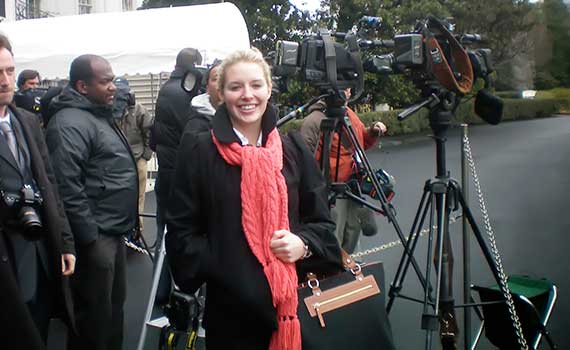
Emily Bradley ’10, pictured here during her internship with the White House press corps, recently returned to campus to give advice to students.
“Connect with a real live human being – be more than a piece of paper and a GPA.”
This was just one piece of advice offered by Emily Bradley Greenfield ’10, the keynote speaker at the 2nd Annual Internship Banquet, hosted by the (CCS) on September 29.
The banquet allowed first-year students and sophomores to sit down with upperclassmen, who were readily prepared to provide advice about how they landed their internships, catalog tricky questions they’ve encountered in interviews, and describe the day-to-day life of an intern.
The evening started off with a panel discussion, featuring Joe Aiken ’16, who interned at McMaster-Carr in Cleveland, Ohio; Carolina Batista ’17, who was an awareness programs intern for the Run for the Cure Foundation in Tokyo, Japan; Adam Basciano ’16, who interned for the Senate Foreign Relations Committee in Washington, D.C.; Samantha Beutler ’16, who was a public relations intern for the Food Network in New York, N.Y.; and Julia Yarrington ’16, who interned with McLean Franciscan Child/Adolescent Mental Health Programs in Boston, Mass. Following the panel, students and faculty broke off into small groups to share insight and ask questions.
Panelists represented both the impact of a great internship and the CCS aim to make such internships more accessible to the student body as a whole.
For the summer of 2015, CCS’s ever-growing summer funding program awarded 211 students grants to cover supplemental costs of their summer experiences, such as travel, housing, food, utilities, and commuting. These students, who created concise, thoughtful proposals, received an average award of $2,935. Career services offered an impressive total of $726,490, thanks to generous contributions from alumni and parents.
“Even with relatively stringent Department of Labor restrictions, many internships remain unpaid or underpaid,” said Shauna Hirshfield, internship coordinator at CCS. Often this renders internships, a valuable way for students to stand out to potential employers and graduate schools, “inaccessible for those who do not have the financial means to support themselves while pursuing the experience.”
These grants do not replace wages – instead they make it possible to take advantage of opportunities. The program has steadily grown since it was revamped in 2012. Between 2014 and 2015, applications increased 55 percent. For those who don’t receive funding, the application itself is a learning experience – students create budgets, work with airtight deadlines, and learn to craft a convincing proposal.
In addition to accepting offers across the country, this year, 31 students gained the financial means to explore interests outside of the United States. şÚÁĎÍř students were in workplaces in locales such as Tanzania, Vietnam, Uganda, Mexico, Korea, Thailand, and China.
The general CCS Internship Fund complements the variety of fellowships sponsored by individual alumni. These have been part of a longstanding dedication to support students in their internship exploration but they often have more specific guidelines for the field or student’s financial situation.
“Internships provide an essential ingredient to the power of a şÚÁĎÍř student’s education,” said Mike Sciola, associate vice president for advancement and director of career services. “Students gain insight, skills, and direction that they bring back to the classroom and that employers and graduate programs seek in top candidates. By ensuring all students have access to internship and summer research opportunities regardless of their financial needs, we empower all of our students toward success.”
